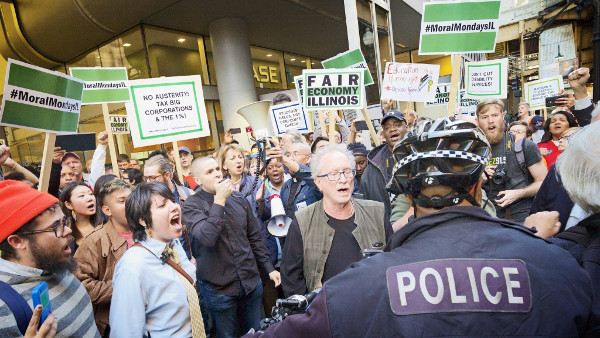
PHOTO/ FRANK JAMES JOHNSON
CHICAGO, IL — All of us value health, but not all of us have to think about it every day. In this article I argue that the recent Illinois state budget impasse is/was deeply unjust. The reason is that many individuals who need care are not being provided it. Among those affected are persons with intellectual and developmental disabilities, such as Autism, and mental illnesses, such as schizophrenia.
Illinois is still funding elementary and high schools for the Fall semester, and this is laudable. But many individuals are feeling pain that Governor Rauner and the General Assembly are not. For instance, state funds are no longer available to many assistance programs for the disabled, poor, children, and the elderly.
Active Visions Inc., which offers counseling and community integration services, among many others, to children and adults with developmental and intellectual disabilities, is one such organization. It maintains homes where residents can learn self-determination and autonomy, and prides itself on its ‘person-centered’ approach to care for the disabled. This approach stands in stark contrast to the austere (read: non-person-centered) approach advocated by Governor Rauner, whose proposed 2016 budget would slash $1.5 billion to Medicaid, which is the largest source of mental health funding in Illinois. The Rauner budget would also include $87.8 million in cuts to mental health services, such as psychiatric care, funded by the Department of Human Services.
Yet the budget impasse itself also has significant human costs, and to many feels like a “death march”, says Al Ridley of Illinois Partners for Human Services. Centerstone, a not-for-profit which seeks to prevent and cure mental illness and addiction disorders, is another organization slowly being suffocated by the impasse. According to John Markley, CEO of Centerstone Illinois, people asking to see psychiatrists are denied because that particular service is among those not being funded while our lawmakers quarrel. This is following a trend: According to the National Alliance on Mental Illness, between fiscal years 2009 and 2015, Illinois cut its Medicaid by $3.2 billion, human services by $1.2 billion, and the mental health budget by about 30 %.
About 9% of persons with schizophrenia kill themselves, and as many as 15% of depressed individuals do. Medications protect against suicide, but these are prescribed through the psychiatric care that is not being funded.
These are real people who suffer in often unimaginable ways, and it is the duty and human obligation of our elected representatives to find the money to care for them. If we are to develop ethically as a nation, be respected by the international community, and if we are to care for those who need care the most, we must address systemic issues such as these.
As long as it is denied that healthcare is a human right, budget impasses such as this one, and the human suffering that follows, will continue.
